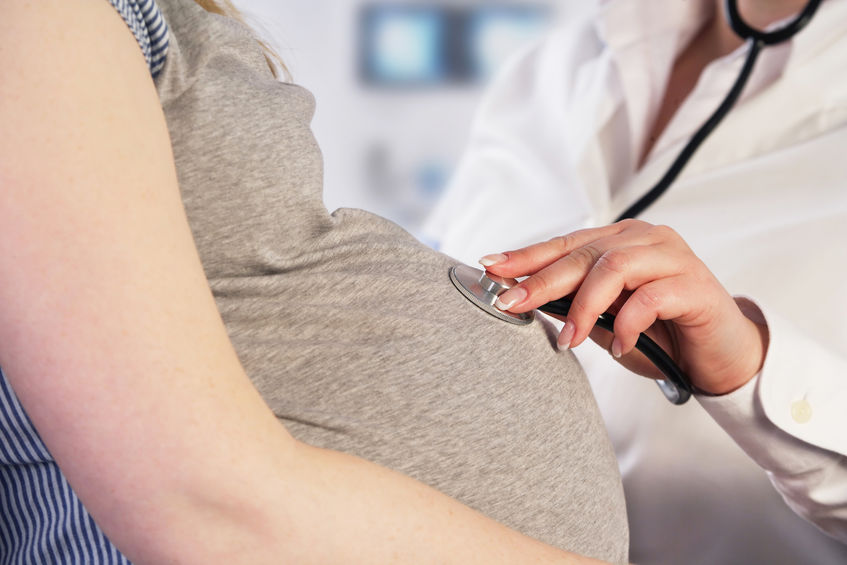
Prenatal testing
Non-invasive prenatal testing
These tests do not interfere with the body of a woman or a child in any way, they are completely safe and do not carry any risk of complications. They determine the risk of genetic diseases in a child and estimate the risk of premature birth.
These include genetic ultrasound, PAPP-A double test and SANCO test (formerly NIFTY)
Invasive prenatal testing
They consist in collecting material for tests straight from the mother’s uterus with a needle under ultrasound control. These tests carry a small risk of complications such as miscarriage (about 1%), until recently it was the only method that gave a final answer whether the child is healthy, now these tests are often replaced by non-invasive tests from the mother’s blood (SANCO test)
Read about:
Non-invasive prenatal testing:
Invasive prenatal testing:

Genetic ultrasound
It is performed between 11 and 14 weeks of pregnancy. This examination resembles a standard pregnancy ultrasound, in which the child’s nape translucency (NT) and the presence and structure of the nasal bone are assessed. Incorrect results of the examination confirm an increased risk of genetic diseases such as: Down’s syndrome, Patau’s syndrome, Edwards syndrome, neural tube defects, cleft palate.
PAPP-A double test
It is an examination based on the combination of a genetic ultrasound with an analysis of the mother’s blood. The blood test measures the concentration of Protein A and free beta-HCG unit. The mentioned parameters are markers of genetic changes of the above-mentioned defects and diseases. In the event of a positive double test, further diagnosis with SANCO or amniocentesis is required.
SANCO prenatal test
The Sanco test is a genetic screening test for pregnant women that can be performed from the 10th week of pregnancy. The test determines very precisely, in a non-invasive way, the risk of trisomy and other selected chromosomal disorders in the fetus. During pregnancy, DNA from the placenta circulates in the pregnant woman’s blood. The test is performed by taking 10 ml of the future mother’s venous blood. Based on the analysis of this sample, it is possible to assess chromosome number abnormalities and damage, including the most common chromosomal defect, which is Down syndrome. The test is safe for both mother and child, and its detection rate exceeds 99.5%. Thanks to it, many mothers-to-be can avoid the invasive tests (including amniocentesis) they fear so much. The test can be performed between 10 and 24 weeks of pregnancy.
Fetal heart echo
The essence of the test is the detection of abnormalities in the heart that allows for quick treatment after delivery . A heart echo enables the diagnosis of heart defects and irregularities in the child’s circulatory system. During the examination, the structure of the heart and chest are carefully assessed. Using the Doppler ultrasound, it is possible to accurately analyze the blood flow through the heart and measure the pulse.
Thanks to this technique, we are able to diagnose fetal heart arrhythmias, valve defects and heart defects.
This test is performed after 19 weeks of pregnancy and can be repeated at any stage, if indicated.
Half prenatal ultrasound
The main purpose of performing a half-time ultrasound is a detailed assessment of the child’s anatomy in terms of congenital abnormalities and the approximate weight of the fetus and gestational age. During the examination, the doctor will assess whether the child is developing properly and examine the internal organs. When performing a half ultrasound, all organs are already very well shaped, and the bones are so soft that they do not obscure them. It is at this time that you can best see your baby. If you did not know your baby’s gender beforehand, it will most likely be during a half ultrasound.
Half-time ultrasound is performed between 20 weeks of age. a 22. week of pregnancy. They can be performed already in the 18th week of pregnancy, but it is worth waiting until 20 before the examination. or 22. week, because it is at this time that all the most important organs and parts of the fetus’ body are best seen and thus the examination is more reliable.
Amniocentesis
It is a test that involves taking a sample of the amniotic fluid to diagnose metabolic and genetic diseases of the fetus.
Amniocentesis is performed from the 15th week of pregnancy. In special cases, when obtaining the result is crucial for the well-being of the baby and mother, it can be done earlier. There is a slight risk of complications of about 1% (including miscarriage).

Examination of miscarriage material
It is performed in order to determine the cause of miscarriage, in particular in habitual miscarriages, and to determine the sex of the fetus. The test checks selected chromosomes using the QF-PCR method
Genetic examination of the material from the miscarriage gives the chance to find out the cause of the loss and shows the doctor the direction of further diagnosis or treatment. The test result allows you to determine the chances of maintaining another pregnancy.
The proper material for the analysis should be the chorion, which is collected by the doctor performing the cleansing procedure. In the case of spontaneous expulsion of the fetal egg, it is also possible to examine it genetically. The material should be placed in a special container and poured over with a neutral saline solution.
Chorionic villus sampling
This test is performed in early pregnancy to detect possible diseases, genetic defects of the fetus. Chorionic villus sampling is usually performed in the first trimester of pregnancy between 10 and 13 weeks. This procedure involves collecting the villi from the chorion under ultrasound control. Biopsy, performed both transabdominally and transvaginally. The choice of the method by which the procedure is performed depends on the location bearings and the fetus. This test allows you to estimate the likelihood of a child developing genetic defects or diseases.
There is a slight risk of complications of about 1% (including miscarriage).


